 | Archbishop Tutu
Archbishop Tutu is certainly the best-known church leader in South Africa. His international fame was established during his years as SACC General Secretary and as Anglican Bishop of Johannesburg and then Archbishop of Cape Town. In 1984 he received the Nobel Peace Prize. In this interview which explores what Tutu wrote about Hurley in 'Denis Hurley: A Portrait by Friends' he speaks about Hurley as a "fearless and articulate adversary”, warm and approachable with great "sharpness of mind” and considerable ecumenical commitment. He speculates that Hurley must have found it difficult to accept a number of Catholic positions on subjects such as the ordination of women and the refusal to allow people of other churches to receive communion. He says that Hurley would be his first choice to be a cardinal and to be canonised. |
| Bishop Dominic Khumalo OMI
Bishop Dominic Khumalo, who became Durban's first auxiliary bishop in 1978, first met Father Denis Hurley in 1940 when the latter had just returned from his priestly studies overseas. From their first encounter he warmed to the young priest. As a bishop and archbishop he found Hurley endlessly patient and understanding of human foibles and weaknesses and always insistent on respecting the human dignity of even the most difficult personalities. However, Khumalo had difficulty in translating for Hurley, difficult because of the length of his sentences; he also balked at some of the assignments he was given as auxiliary bishop - not infrequently to bring peace in situations of conflict. Khumalo reflects on the antagonism of some French (Breton) priests, and of Chief Buthelezi after early years of great friendship with Hurley. He declares himself to have been firmly on Hurley's side in these difficult relationships and speaks extensively of how much the Zulu people loved the archbishop, and how his lack of Zulu did not detract from their admiration for him. |
 | Ela Gandhi
Ela Gandhi, granddaughter of Mahatma Gandhi, Chancellor of the Durban University of Technology, remembers first meeting Archbishop Hurley when she was at Durban Girls’ High School. She also recalls his visits to her parents, Manilal and Sushila. She was struck by his empathy for anyone who was suffering, and how, in his public prayers, like Gandhi, he always mentioned both the victim and the perpetrator. She mentions his participation in the fast when Mewa Ramgobin was banned and in the Committee for Clemency which called for the release of all political prisoners. |
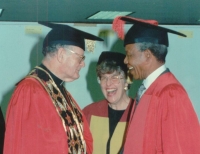 | Brenda Gourlay
Professor Gourlay is the Vice-Chancellor of Britain’s Open University. She had many dealings with Archbishop Hurley especially at the time when she was Vice Chancellor and Principal of what was then known as the University of Natal and is now the University of KwaZulu-Natal (UKZN). She regarded the Archbishop as the "perfect chancellor” at the time he held this office, 1993-1998, and, in fact, the "best chancellor she had ever known”. They became close friends during these years and, as a result, the University was sometimes called the "Hurley-Gourlay show”. Professor Gourlay appreciated the Archbishop’s integrity, his wide intellectual interests, wise counsel and marvellous sense of humour. |
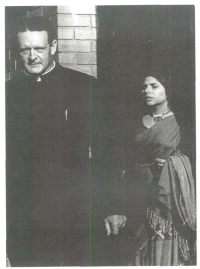
| Prof Fatima Meer
Prof Fatima Meer is a retired professor of sociology from the University of KwaZulu-Natal. Her friendship with Denis Hurley grew over the years as a result of working together in opposing injustice. She recalls how the Archbishop visited the Tin Town settlement where she was working and how they went together to see Colonel Steenkamp of the Special Branch to express their concern about the safety of detainees after Ahmed Timol had died in detention in Johannesburg. Other memories are his standing with a placard in central Durban together with her and Alan Paton, and his regular attendance at Alan Paton’s birthday party each year. |
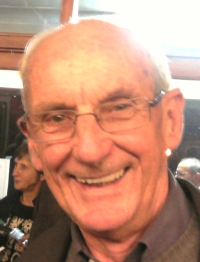 | Fr. Albert Nolan, OP
This is a fascinating interview with South Africa’s best known theologian whose Jesus Before Christianity and Jesus Today: A Spirituality of Radical Freedom have received international acclaim. He covers a wide range of issues: Hurley’s enthusiasm about Teilhard de Chardin, the See-Judge-Act methodology of Joseph Cardijn, the community of Sant’Egidio, his refusal to sign the Kairos document and the Road to Damascus and his opposition to Humanae Vitae. Nolan helped to organise Hurley’s first meeting with Oliver Tambo of the ANC and was himself present for this meeting. He recognised how Hurley, in his honesty and openness to the truth, was even more of a Dominican than many members of that order. This and Hurley’s humility are the two qualities for which he will especially remember the Archbishop. |
| Professor Ottie Nxumalo
Professor Ottie Nxumalo, who was at one time Director General in the Office of the KwaZulu-Natal Premier, first got to know Archbishop Hurley in relation to translation of the liturgy from English to Zulu and then being invited to provide simultaneous translation at the first synods of the Archdiocese of Durban, gatherings which he saw as models of democracy. He reflects on the Bishops’ Campaign for the mission schools in the 1950s, Archbishop Hurley’s relationship with Chief Mangosuthu Buthelezi, his own (Nxumalo’s) disappointment about how the saga of Mother Euphemia at Montebello was handled, and how he personally was influenced by the Archbishop’s example as a hard worker. |
 | Ian Linden
Ian Linden is Associate Professor at the School of Oriental and African Studies in London, and currently assists former British Prime Minister, Tony Blair, in his peacemaking efforts in the Middle East. He is a former Director of the Catholic Institute for International Relations (CIIR, now known as Progressio), based in London. In this interview, he recalls arranging for Archbishop Hurley to meet ANC President Oliver Tambo, traveling with the Archbishop to speak about the need for sanctions against South Africa, as well as the important role Hurley played in healing rifts between the English-speaking and Portuguese-speaking bishops in IMBISA (the Inter-territorial Meeting of Bishops in Southern Africa). |
 | Father Pierre Hurtubise OMI
Father Pierre Hurtubise OMI, currently Director of the Research Centre for the Religious History of Canada at St Paul's University in Ottawa, was a newly-ordained priest studying in Rome at the time of the Second Vatican Council. Having been asked by a French newspaper to write a weekly column about the Council, he was delighted to meet Archbishop Hurley who was also staying in the Oblate General House. Hurley was writing a weekly column for The Southern Cross, so these two Oblate "journalists" used to regularly swap notes. It seems that Hurley had an excellent understanding of the dynamics of the Council and was very ready to share these with his much younger colleague. Hurtubise gives a fascinating account of their conversations. |
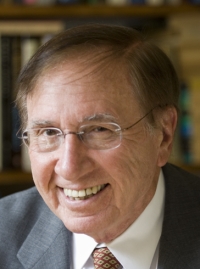 | Robert Blair Kaiser
Robert Blair Kaiser, better known as "Bob", became famous as Time Magazine's Rome correspondent during the Second Vatican Council. One of the ways in which he used to keep in touch with what was happening in the Council was to invite leading bishops and theologians to come to his family apartment on Sunday evenings for supper. One of those who regularly attended and relished these lively occasions, was Denis Hurley who dubbed them "Bob Kaiser's Academy". In this interview, Kaiser gives a vivid portrait of these stimulating events and Hurley's role in them. |
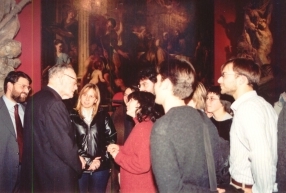
| Community of Sant'Egidio, Rome
Sant'Egidio in GenoaFounded by a group of young Italian laypeople inspired by the Second Vatican Council, the community has now spread to many countries around the world, including South Africa. Their central belief is that it is only possible to understand the gospel by serving the poor. This they do through their work with the homeless, the elderly, gypsies, people living with AIDS and many others. Increasingly they devote attention to peacemaking in situations of conflict, most notably in successfully securing a peace agreement in Mozambique.
Denis Hurley first came to the notice of the community when he was charged with making false allegations against the Koevoet anti-insurgency unit in Namibia. Sant'Egidio found in Hurley an enthusiastic supporter of their work and a living link with the Vatican II, source of their own inspiration.
|
 | Pastor Philip Dladla
This is a remarkable testimony by Pastor Philip Dladla who was a shop steward at the BTR Sarmcol factory at Howick, just outside Pietermaritzburg. He was one of 900 workers who were dismissed by BTR Sarmcol in 1985 because they went on strike about Sarmcol's refusal to recognise their union. Pastor Dladla describes the supportive role that Archbishop Hurley played towards the Sarmcol workers. He gave permission for churches to be used for the dismissed workers to have meetings, he gave practical relief to the workers who lacked the basic necessities of life. He arranged for a large farm to be donated to the workers so that they could grow crops to feed themselves, and "played such a crucial, crucial role in the struggle of the trade union movement". "He put himself squarely into the shoes of the workers and walked along with all of us."
|